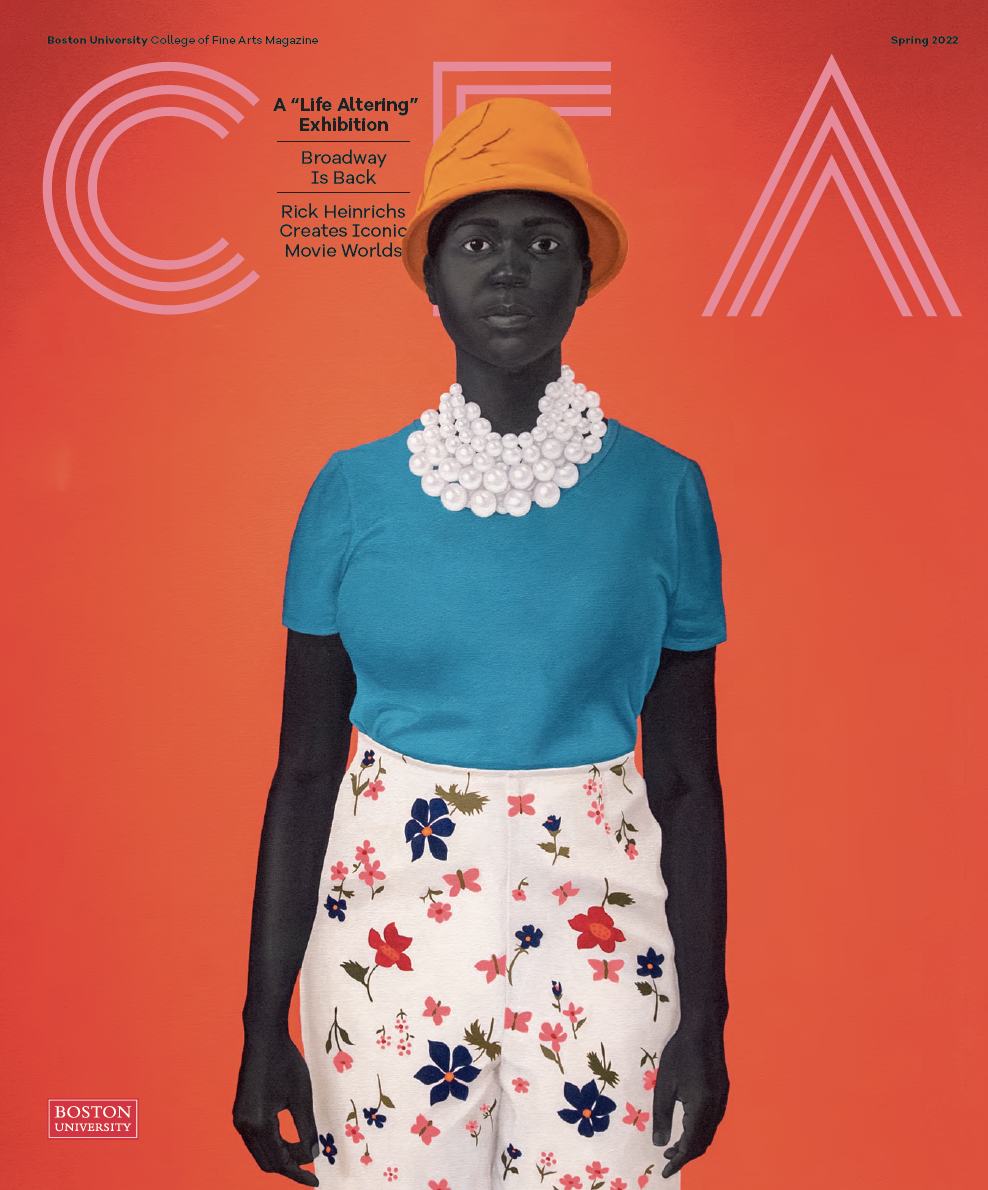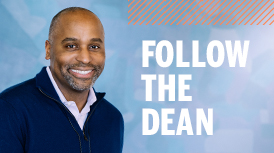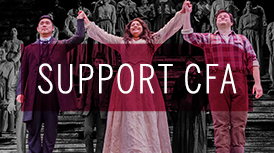The Real Thing
Russell Hornsby (’96) brings complexity and grace to his role in The Hate U Give
By Joel Brown | Photo by Benjo Arwas
Maverick Carter stops his SUV in front of his house and growls at his three children to “get out of the car and line up on the grass.” A confrontation with the police has ruined their family dinner out. His teenage daughter tearily blames herself for causing it by speaking up about the police shooting of a friend. In the 2018 film The Hate U Give, Maverick is an ex-con, ex-gangbanger, ex-drug slinger, a man with volatile emotions who seems ready to explode—but what he says to his children is unexpected: “Point 7 of the Black Panther 10-Point program! Stop crying and say it!”
The children gather themselves to repeat: “We want an immediate end to police brutality by any means necessary.”
Maverick leans in to tell them that some things are worth speaking up for: “Don’t ever let nobody make you be quiet!”
In most American movies, Maverick would have been absent or in jail or on the streets, says Russell Hornsby, who plays him in The Hate U Give. Maverick might come around to bicker with his wife, but he wouldn’t be much of a parent, a stereotype reflecting society’s distorted perception of black culture.
But in the film, based on Angie Thomas’ 2017 New York Times bestselling young-adult novel by the same name, Maverick is a store owner who has long steered clear of his old gang ties, a hard-edged but fully present family man determined to keep his kids safe in an America that seems hostile to their very survival.
“We’re saying now that we need to see a well-rounded image of who we are,” says Hornsby (’96). “The truth of the matter is, Maverick does exist. There are men who are felons and ex-cons who have come out and made good on their lives. And they do have families and they do have loved ones and they are present. And that’s what we needed to show.”
The 2018 film The Hate U Give is based on Angie Thomas’ 2017 New York Times bestselling young-adult novel by the same name. 20th Century Fox
Changing the conversation
For many years, a black ex-con with gang ties in an American movie was usually a powder keg certain to explode in violence; films depicting the civil rights struggle often had passive black characters menaced—and saved—by white characters. It was hard for African Americans to find their lives depicted authentically, in all their complexity, on-screen.
A change began, Hornsby says, with Spike Lee’s early films and a personal favorite, 1995’s Devil in a Blue Dress, directed by Carl Franklin, starring Denzel Washington and Don Cheadle. “That is one of the most authentically black films that you’ll ever see, in my opinion. We’re just living. We’re not struggling, and trying to overcome, and all this kind of sh-t. We’re just living. And you see the black world they live in, and how they talk, in their own world, where the cloud of The Man isn’t over them. That’s us, and it’s so beautiful.”
That kind of climate change may be accelerating for black filmmakers in the era of Black Lives Matter and a president seen as openly racist by many. Hornsby points to Moonlight (“beautiful and deeply honest”) and Get Out as recent films that treated black characters and black concerns authentically.
Many said the same of The Hate U Give. The movie, which was directed by George Tillman Jr. and written by the late Audrey Wells, garnered critical acclaim and honors, including the audience award at the 2018 American Film Festival and a Top 10 ranking from the African-American Film Critics Association. Hornsby’s performance earned him a best supporting actor award from that group, and enough award-season buzz that the New York Times did an interview, although an Oscar nomination didn’t materialize.
Amandla Stenberg plays Maverick’s teenage daughter, Starr, who attends an upscale, mostly white prep school and is the only witness when a white cop shoots an unarmed young black man. Her emerging activism throws her family into a maelstrom of controversy, pulling in the police, media, protestors, and the local drug lord. But instead of acting like the stereotypical hothead, Maverick stands by his daughter, even stays with her the night after the shooting, holding a bucket when she vomits, comforting her as best he can. He knows too well the aftermath of violence, but he is also a loving dad, and tells her the world needs her: “Shine your light.”

Maverick Carter (played by Russell Hornsby) explains to his young children what to do if they are ever stopped by the police. Erika Doss/Twentieth Century Fox
Drawing from life
To tap into Maverick’s complexity, Hornsby drew on his own upbringing. He grew up with a single mother in Oakland, Calif., “not always the safest and best place to live,” even though they weren’t in the toughest part of the city. When he wasn’t in school, he spent a lot of time at the Dimond Recreation Center, where a crew of older men on staff watched over the kids summer after summer.
“They were good guys, but gruff, they talked to you in a certain way that commanded respect,” he says. “They weren’t doing anything illegal, but they talked to the around-the-way cats, the drug dealers, whatever. But there were also moments when they had a different kind of compassion, when a little kid fell and scraped his knee, and they’d hold him and be like, ‘Don’t worry about it young man, we’ll clean you up and you’ll be back playing in no time.’ And then later, you’re older, and you hear them talking about how their wife’s having another baby and how are they going to pay the rent or feed this child. It humanized them.”
“In images, it’s important to strike racism a metaphorical blow, and i think that’s what maverick does. that’s what you do when you’re able to color a character in with dimension and nuance and grace notes.”
Russell Hornsby
In 1999, when he was in his mid-twenties, Hornsby played Youngblood in a production of August Wilson (Hon.’96)’s Jitney, one of a handful of the playwright’s works he has performed in. The other actors were mostly older black men with families and money problems and complicated personal histories. He learned as much from them offstage as on, listening to them talk about their struggles and burdens, failures and successes, how they kept going. “And I have to honor those men, because I heard their voices. Me playing Maverick, that’s me saluting them and saying thank you for helping me.”
Maverick reflects all these men, Hornsby says. “That’s why the movie is so important, because the larger part of society has not seen that image of black men. In images, it’s important to strike racism a metaphorical blow, and I think that’s what Maverick does. That’s what you do when you’re able to color a character in with dimension and nuance and grace notes.”
A deep dive into creating character
When he was a younger actor trying to make his way from the stage to Hollywood, Hornsby was mostly just thinking about getting work, but when he auditioned to play stereotypical thugs, he got rejected.
“I spoke proper English,” he says with mock regret, and Hollywood was hiring rappers for their real-life street cred. “‘No, he can’t be a ghetto guy, he’s too clean-cut, he talks clearly, he enunciates! He’s not black black, he’s just black.’”
He did get cast in 2005’s Get Rich or Die Tryin’, the 50 Cent movie, playing a henchman with gold teeth, but they cut a lot of his scenes.

Hornsby can play doctors, lawyers, and cops with the best of them, but Maverick was a responsibility as much as a role. Preparing to play him demanded a deep dive into the character. Benjo Arwas
In retrospect, the reverse stereotyping served him well by allowing him to play other things: a hospital chief resident when he was just 26, a cop with kids. In NBC’s fairy-tale-noir series Grimm, he was a tough cop helping his partner keep the peace between humanity and mythological creatures. And in February, he debuted on Fox’s Proven Innocent as a lawyer who gets series star Rachelle Lefevre out of jail after she’s wrongfully convicted of murder. They partner up to help others unjustly behind bars.
Hornsby can play doctors, lawyers, and cops with the best of them, but Maverick was a responsibility as much as a role. Preparing to play him demanded a deep dive into the character.
“I sequestered myself for a month because I wanted to imagine that solitude and confinement he had while he was in prison,” says Hornsby, who lives near Hollywood. “I asked my wife to take the kids, and she went to her mother’s for a month. My day consisted of getting up early, going to the gym, coming back and making a simple breakfast, reading and writing. I immersed myself in his world, because you have to create the character from the inside out. You write out who the character is, you write out his biography, the things he thinks about. It was taking time to walk around the city by myself and find his walk, his speech patterns. These are the details you have to get into. It’s about being honest and truthful about who he is.”
Hornsby talks with The Movie Times about how black men and black fatherhood are—and should be—portrayed on-screen. The Movie Times
It’s difficult to pull apart the threads of a performance, he says. But he offers an extraordinarily subtle example of how that preparation played out on-screen: watch Maverick walk, he says, when the family approaches the courthouse where Starr is going to testify about the police shooting. “You see the walk right there, and you see the way my hands form. They’re kind of open and they’re spread by my side. This openness. And the reason is, you’re in prison, you’re in a six-by-nine-foot cell, right? Your gait is smaller when you come out, because you’re so used to being in a confined space. So what Maverick had to do was relearn how to walk, and now there’s more freedom in the walk. He’s more expressive than he used to be, because he’s a free man. You’re in prison and you lose yourself because you’re confined, and you’ve got to find yourself again.”
Other roles have also required Hornsby to do the deep dive, like Lyons, the son of Denzel Washington’s character in the 2016 film adaptation of Wilson’s Fences, or grieving father Isaiah Butler in the well-received 2018 miniseries Seven Seconds. That preparation means that once he gets to the set he’s ready to work, to “drop in” to the character. “You get into the makeup trailer and then, boom.”
“I immersed myself in his world, because you have to create the character from the inside out.”
He’s gotten the best notices of his career in these parts. But film industry kudos aren’t what motivates him. “If you are waiting for somebody else to validate you, you are going to be waiting a long time,” he says. “I have had an objective career in a subjective industry, you can’t deny that, so just in that alone I am victorious.”
With Proven Innocent soon to finish shooting, he says, “I get to go back and sow some more work; 2017 was planting season and ’18 was the harvest, and now I have to go back to planting.” He’ll continue to look for roles that expand the way black men are defined on film, and he’s optimistic, to a point, that more such roles are becoming available.
“We’re no longer having our stories told or intercepted by the dominant culture,” Hornsby says. He sees The Hate U Give’s journey to the big screen as a turning point: in the past, a book by a black woman about her experiences and culture would not have been adapted “truthfully and honestly,” he says. “I think we’re having a renaissance in that people are having an opportunity to tell their stories in their way authentically.”










